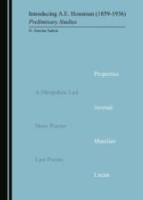
Cambridge Scholars Publishing (2018) h/b 174pp £71.20 (ISBN 9781527505919)
This short book comprises the following: (1) A.E. Housman: Initial Remarks; (2) Biographical Notes (in six sections); (3) Prolegomena on the History of Textual Criticism; (4) A.E. Housman’s Text-critical Idealism; (5) Text-critical Issues in the Classical Papers of A.E. Housman (in three sections); (6) His critical editions: Juvenal, Lucan, and Manilius; (7) An English Poet and Lyricist; (7) Appendix: The Polemics of ‘Sexual Criticism’: Interpretative Thoughts on Alfred and his Private Life. There follows a brief section entitled Reference Works, which includes some articles.
S. states his object as being ‘to introduce novices to the basic elements of the scholarship of A.E. Housman’. There is already a substantial body of work on Housman, as scholar, poet, and (to abbreviate) ‘man’, but that does not imply that there is no room for a book such as that under notice here. Of course, it is difficult for anyone who is not him(her)self a classical scholar justly to appreciate the work of so distinguished a practitioner as A.E.H., and S. would have benefited greatly if he had simply adapted to his needs the chapters in Butterfield and Stray (A.E. Housman: Classical Scholar [2009]) on Juvenal (by Robin Nisbet), Lucan with Fraenkel’s review (by S.P. Oakley), Propertius (by S.J. Heyworth) and Manilius (by E. Courtney); incidentally, better use is made of S. Timpanaro on The Genesis of Lachmann’s Method, though S. does not acknowledge that he is using G. Most’s excellent commentary (2005) on that book.
As it is, the ‘novice’ reader may well not realise just in what are to be found the remarkable qualities—all different, and certainly not without failings—of Housman’s three major editions; and the reviewer suspects that S. does not fully understand the importance of Richard Bentley both in the history of classical scholarship and to Housman himself. In the chapter on Housman’s poetry, one misses any reference to John Bayley’s book (1992) on it, which, indeed, is also omitted from the ‘Reference Works’. The book’s final chapter takes a somewhat dismissive line on Housman’s (now generally accepted) homosexuality, which this reviewer did not find persuasive.
A problem of no lesser import lies in the fact that the reviewer noted well over 40 places where there are misprints, simple mistakes, omissions, or inelegancies of diction so marked as to obscure the sense: it would perhaps be unfair to list them. A further aspect which cannot be ignored lies in the number (12 in all) of lengthy digressions in the footnotes, which are, at best of marginal relevance, especially in a book which is aimed at advanced school pupils and undergraduates.
By chance, a large new biography of Housman arrived by the same post as did the book under review—testament, if such is needed, to the enduring and widespread interest that A.E. Housman still arouses. This book is, it must be said, extremely expensive for an offering which is modest in size and which, by giving grounds for all-too-frequent censure, does not adequately fulfil its admirable intention.
Colin Leach
